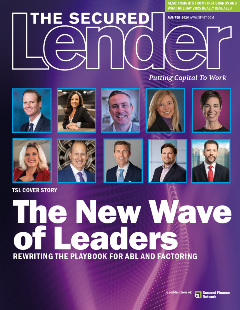
Emily Carroll
Senior Vice President, Regional Underwriting Manager, PNC Business Credit
40 Under 40 Category: Underwriting
Biography:
Emily began her ABL career at Finova Capital and has been at PNC Business Credit for the last 14 years. She joined PNC as a field examiner in Philadelphia and then moved to the Underwriting group where she spent four years working on increasingly complex transactions. Emily then relocated from Philadelphia to the PNCBC Pasadena, CA office where she spent five years in the Portfolio Group as a senior relationship manager, managing up to 15 accounts including several difficult workouts. Emily rejoined underwriting as a team leader in April 2015, a year later was promoted to regional underwriting manager, and today manages six underwriters across the country. Emily graduated from Villanova University with a BS in finance and international business and obtained an MBA with honors from Drexel University.
What role has mentoring played in your career?
Aattribute a large part of my success to having good mentors. I am fortunate to have several (unofficial) mentors who have really helped guide me along the way, and shaped my professional development. I would strongly suggest that everyone find one or more mentors, and maintain these relationships throughout your career. The best mentors aren’t just people who can answer your work-related technical questions, but rather those who can provide support, guidance and advice on how to deal with situations that you may find yourself in. Your mentor doesn’t have to be in your same position, line of business or even your organization. In fact, you may find it helpful to have advice from someone in a different firm or line of business.
Don’t wait. Don’t just sit back until a corporate program assigns you a mentor – reach out to a senior person in your organization whom you respect and think will be interested in providing you guidance. And, most importantly, don’t forget to give back and mentor younger professionals yourself!
What do you know now that you wish you knew when you first started your career?
If I could go back in time to my early career, I would tell myself how important it is to stick up for one’s self and voice one’s opinions. It may seem easier to be agreeable and go along with what others tell you, and you may think that puts you on the path to being well-liked, but people will actually respect you more when you take a stance on an issue, even if that means politely disagreeing with others on the team. It takes a lot of confidence to stand up and say you disagree with someone (especially if that someone is your senior), but you may just be right and point out something they hadn’t thought of. Alternatively, you may be wrong, but then you’ll likely get a good explanation and learn something new. You can’t add value when you stay quiet.
I also think it’s important to keep an open mind when it comes to your career path. I’ve taken a position or two along the way that—at the time—I didn’t really want, but they ended up serving me well for a couple of reasons. Firstly, I gained a variety of experience in different areas, thus making me a better-rounded individual. The most successful of us are those with a diverse background and a broad array of work experience. Secondly, it sent a message to senior management that I am a team player and am willing to step up when needed. Finally, you never know whether or not you will like something until you try it. By trying different positions within your organization, you may discover you have a skill set that makes you particularly well suited for that role. Being confident, flexible, and continuing to learn from mentors have opened doors for me and shaped my career.
The Secured Lender

SFNet's The Year Ahead Issue


